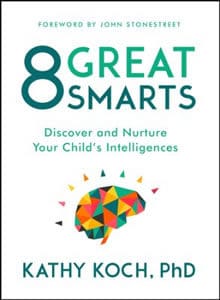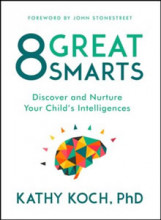
The War of Words
In this Adventures in Odyssey drama, a carelessly uttered word from Eugene creates havoc as it becomes the fashionable insult, resulting in a lesson about the power of words.
Home » Episodes » Focus on the Family Broadcast » Intelligence: Discovering Your Child’s Unique Gifts (Part 1 of 2)
Excerpt:
Dr. Kathy Koch: And kids need to know they’re smart or they’re never going to feel as good about themselves and then they lower their expectations for their tomorrows, and they don’t achieve maybe as much as they could have.
End of Excerpt
John Fuller: That’s Dr. Kathy Koch and she joins us today on Focus on the Family. Your host is Focus president and author Jim Daly and I’m John Fuller.
Jim Daly: John, you know, there is another school year right around the corner. Man, it comes fast. Summer just blows by, doesn’t? And, uh, we’re all gearing up as parents to get those kids back into the rigors of study and sports and all of the things that they’re going to be doing. And, uh, are you ready?
John: No. Not even in the least.
(LAUGHTER)
Jim: That’s fair. But it busy. It’s busy in that way. And it’s a good thing for parents to be engaged and I’m looking forward to it. Uh, you know, for Trent and Troy, um, I’m excited to hear from our guest today, Kathy Koch, because she is so wonderful at identifying the assets and the gifts and the talents that our sons and daughters possess. And to help us as parents better understand how to identify those gifts and talents and then how to, hopefully, accentuate them and make sure that the kids feel, not just good about themselves, but they understand who they are better. And, uh, you know, Trent and Troy, they’re so different. Um, you know, Troy’s the kind of kid – when I – we go on vacation, he’ll get his homework done a head of time. I mean, it’s a – it’s a blessing. You know, you don’t have to nag him. He’s – he’s, “Hey, I’m done. I did it.” “When is it due?” “Two weeks from now.”
John: (Laughter).
Jim: Wow. I mean, who doesn’t want that kid? And then, Trent struggles a bit more. You know, he does it the night before he’s going back to school. (Laughter). And, uh – and those are the kinds of things we want to talk about today. The – the personality types, how they play into school, and we’re right there on the precipice with school and I think it’s going to be a great help for parents today.
John: It’s going to be, Jim. And that includes you and me and several in our control room…
Jim: (Laughter) And millions of listeners.
John: (Laughter) Yeah. And Dr. Kathy Koch has such great heart for children and for helping you be a champion for your children. She’s the founder and president of Celebrate Kids Incorporated and she speaks frequently to parents and educators and even has sessions for kids themselves.
Jim: Kathy, let me welcome you back to Focus on the Family.
Kathy: Thank you so much, Jim. I’m thrilled to be here. Thank you, John, for your enthusiasm as well.
Jim: So, I think as parents we’re both, uh, excited and anxious.
Kathy: Yeah, no pressure.
Jim: (Laughter). You know, why…
John: We just have to leave with the answers.
Jim: …Why – why do we feel that at the beginning of the school year as parents? I mean, it’s gonna be what it’s gonna be. Why do we feel that anxiety, whether or not our sons and daughters are gonna meet the standard?
Kathy: You love your kids, right? And you have a dream for their tomorrows, and you want them to become who they were created to be. And you know they’re not stupid. And you want them to apply themselves. You want them to step up to the plate and hit the home run.
Jim: (Laughter).
Kathy: And at the same time, because I know you, you want them to hit the single, if that’s what they’re called to hit, right?
Jim: Definitely.
Kathy: And – and I appreciate that so much about you and even the passion of Focus in general, is that we’re not gonna be perfectionistic, you know, straight-A students. That’s not God’s design for all of us. So, how do we accept and how do we love and that’s your passion.
Jim: You know, uh, on the show we talked with – I can’t even remember the person that gave me this idea, but they said, “You know, if you got a straight-A student, it might be good for you as a parent to say to them, ‘It’s okay if you get a B.’”
Kathy: Mm.
Jim: And I did that with Troy, my youngest, ‘cause he – he puts a lot of pressure on himself to do really well. And I appreciate that, but I remember the day I did that. I said, “You know, Troy, it’s okay if you bring a B home.” And I just remember him exhaling going, “Really?” I said, “Well, you want to go to your standard, whatever you can achieve, you want to reach for that. But don’t be unrelenting on yourself. You gotta, you know, you can breathe a little.” And I thought that was – it ended up being really good for him emotionally.
Kathy: Excellent. Excellent. And I think when children get older and move into post-high school educational opportunities and career opportunities, they have to discover where to put their energy, right?
Jim: Yeah.
Kathy: When you’re younger, you can do the whole day of school and you can really manage your spelling and your math and your science and your history and your Spanish and your computer and your music and your art and your everything.
Jim: (Laughing) You got it…
Kathy: And then…
Jim: …Covered ’em all.
Kathy: …Well, you know, and then when life gets more complex and assignments get longer and you begin to focus, because God reveals more to you about who He’s really created you to be and where your passions and your giftings are going to land, you have to be able to then say, ‘I’m going to really work hard in chemistry and I’m going to give myself a break in this other class.” And I think there’s wisdom there…
Jim: Yeah.
Kathy: …Or the fatigue sets in.
Jim: Yeah. Well, you’ve written this wonderful book, 8 Great Smarts: Discover and Nurture Your Child’s Intelligences. Talk about that, ‘cause you mention personality type and you can – if you have two children, you have very distinct different people.
Kathy: Mm hmm.
Jim: And I know that’s true for me.
John: Mm hmm.
Jim: You have six kids, John.
John: They’re all different.
Jim: So, you see it…
John: Each one is different.
Jim: …In leaps and bounds.
John: Yeah.
Jim: But talk about that. You can’t parent the same way with each child. You gotta come up with unique strategies, right?
Kathy: Absolutely, for personality, for multiple intelligences, for spiritual gifts. You know, we’re uniquely designed in God’s image. You know, John, your children were not designed in yours and your wife’s and that’s why, you know, they’re different and unique, partly because God is so creative and so complete. So, knowing strategies that work best for one kid may not work best for another, is freeing to you. It can confuse the kids, because it maybe looks like we’re not fair. And I love to say to kids, “You’re not the same, so I don’t treat you the same. That would be unfair…”
Jim: Yeah.
Kathy: “…Because you’re more word smart or you’re more outgoing or you’re most gifted in this way. We expect this from you. We don’t expect the same from your brother. That’s fair.”
Jim: Now you mention word smart.
Kathy: Mm hmm.
Jim: Let’s cover the eight great smarts…
Kathy: Sure.
Jim: …As you’ve identified them. And then we’ll delve into them one by one. But talk about the eight, Just give us the list.
Kathy: A quick overview, great. So, all – and all of us have all eight, if I could start by saying that.
Jim: Okay.
Kathy: I don’t want anyone to list them and go, “Oh, I don’t have that.” Or “My son…” Or “My husband…” No, we all have the capacity for all eight.
Jim: But some are more accentuated?
Kathy: Yeah.
Jim: Okay.
Kathy: Some are strengths. Some are intermediate. Some might not be yet awakened, if our children are young. Or maybe they’re not as strong. I think many adults have five or six or maybe even seven that we can rely on very easily, one or two that we maybe have to choose to go to, if we want to. But here they are. Here’s the eight. Word smart, when we’re being word smart, we think with words. If we’re excited, we tend to talk, and we don’t need an audience.
Jim: (Laughter) What, are you talking into a mirror?
Kathy: Yeah, sure.
Jim: (Laughter).
Kathy: Or we’re talking inside of our head when we’re excited or…
Jim: Okay, I tend – I tend to think that way.
Kathy: Yeah, we talk out loud to process information is often a word-smart characteristic. We’re also logic smart and those of us who are logic smart think with questions. We love it when the world makes sense. We tend to gravitate toward math and science. We love to discover information on our own. And then there’s picture smart people. All of us again, are picture smart. Kids who have a lot of picture smart brain cells, um, think, um, in pictures with their eyes. They tend to be more imaginative and creative and might go toward arts and fiction and history, because things come alive in their mind. They may doodle to pay attention to us actually. And then there’s the music smart intelligence and I really appreciate that this model of intelligences affirms art and music and says to us that these are ways of being smart. This isn’t just being creative. This isn’t just being talented and artistic. You’re talented and artistic because you are smart. And that’s a power word…
Jim: Hmm.
Kathy: …And kids need to know they’re smart or they’re never going to feel as good about themselves and then they lower their expectations for their tomorrows, and they don’t achieve maybe as much as they could have. Those of us who are music smart think with rhythms and melodies. And music is our energy. We create it when we’re excited, so we toe tap, we be-bop, we drum our fingers…
Jim: We “be-bop.” (Laughter)
Kathy: …And irritate our brothers, you know. And it’s a good thing to be music smart. And then there’s body smart people and we’re the ones who move, shake, rattle and roll. We move and we touch, and we do it more when you excite us. And we might be…
Jim: So, it’s not necessarily ADD.
Kathy: No, it’s a great question. ADD/ADHD is a chemical imbalance of the brain. You can actually have that, and you know what I think, Jim? If you’ve taken your kids to a pediatrician and a neurologist and a allergist maybe and a health nutrition person and there’s evidence of ADD/ADHD, any of the other dangerous D’s, so to speak, then call it what it is and medicate if it’s appropriate. But don’t give them an excuse to be inattentive because they have this disability. It’s actually a gift that can be channeled for really good things. And what we’re doing is, we’re saying to you kids, you know, “You can’t do this well, because you’re this.” Well, what if they’re body smart and what if God created them to passionately move? Like I talk with my hands. We’re in a radio studio and no one’s watching but you and I’m talking with my hands, because…
Jim: (Laughter).
Kathy: …It’s part of how I process information. And I don’t want to be told I shouldn’t do that all day long. I won’t be able to think well.
Jim: Well, and that’s a problem in schools particularly and with boys particularly, ‘cause boys tend to move a lot.
Kathy: Absolutely.
Jim: And I remember when my kids were in elementary school and a really smart teacher said to one of my son’s friends in the class, “We’re gonna set you in the back, not as a penalty, but that way you can get up if you want to. And you can stand and move around in the back of the class.” And she just kind of told the whole class what was going on.
Kathy: Wow.
Jim: And, uh – and it seemed to work well, and that boy learned and did well in that class.
Kathy: You know, Jim, if we can give kids the freedom to be who they were created to be and explain the uniqueness factor, so that other kids don’t get jealous or judgmental, it’s powerful. And what I really believe is that when body-smart children who have a need to move and touch, can move and touch when they can, then they will be able to handle it more readily when they can’t, when they’re at grandma’s house with fine china, when they’re in a restaurant and they need to keep their hands to themselves, they can handle that with a bit more self-control because they know they have freedom later.
Jim: Right.
Kathy: Right?
Jim: We’ve kinda dove right into the body smart mode, but let’s stick with it and then we’ll come back and get more detail in the others.
Kathy: Okay.
Jim: But on the body smart one, how does a parent, parent that body-smart child? I mean, I gave an example where a teacher did it.
Kathy: Mm hmm.
Jim: But when that fidgety kid is, you know, he’s just – she or he is doing what he does, how do you refrain from saying, “Johnny, stop it! Come on, Johnny, stop it!” And the poor kid’s going, “I can’t help it, Mom,” when it’s not inappropriate. It’s just energy.
Kathy: Right. I think this understanding is really powerful. When parents look at that behavior and go, “My child is smart,” right there you change your whole perspective towards your child and towards your child’s behavior. And what we don’t want is paralysis to set in. The brain is like a muscle and it’s alive, if you will. And so, if a kid hears constantly, “Sit down. Sit down. Put that down. Sit still. You’re driving me nuts,” they’re gonna begin to really feel broken and badly about themselves and that part of the brain can actually shrink in its size temporarily. Praise God, it can reawakened later if we do the right kind of a thing. So, part of the power in understanding this model is to observe it as behavior, not misbehavior.
Jim: Interesting.
Kathy: You know, it’s misbehavior if a child has been told to sit down and sit still and chooses not to be obedient to that request. But it’s behavior when it’s energy, when they’re thinking, when they’re learning. We process best by movement. So, these kids benefit from clipboards and bean bag chairs and rocking chairs, being allowed to pace. One of the things that I think’s very effective, if you need to talk to a body-smart child about behavior, about school issues, about friendship issues, about anything, don’t make that child sit down and look at you.
Jim: Right. (Chuckling)
Kathy: Let him pace in the kitchen or the dining room or walk up and down the stairs while you’re having a serious conversation. If you make him sit and look at you, he may not actually engage with your thoughts nearly as much.
Jim: Well, right and so, a in-tune parent might say, “Let’s go for a walk.”
Kathy: Excellent idea.
Jim: Yeah, let’s go walk around the block.
Kathy: Let’s go to the swing set.
Jim: Yeah.
Kathy: Mm hmm.
Jim: I mean, that’s a good way to do that. Okay, there’s a couple more. Then we’ll come back and get a little deeper with each.
Kathy: Okay. The nature smart intelligence, these are the kids and the adults who think with patterns. So, it’s related to picture smart, because the eyes are engaged, but it’s the specific ability to see and recognize and remember the patterns. So, I know it’s a bluebird, not a blue jay, because I remember where the blue goes, on either the body of the bird or the wing of the bird. I know the names of the clouds. And I don’t. I’m not very nature smart. I am nature smart, because all of us have all eight. I have greater interest than ability and you’d think that because I fly all the time, I’d want to know the names of those clouds. But because I’m not very nature smart, that vocabulary doesn’t stick.
Jim: Okay, is there another one or is that it?
Kathy: There are two more.
Jim: Okay, hit it.
Kathy: It’s so interesting. People smart people think with other people. So, we like to talk, and we need an audience. We get our joy from telling what we know. We’re brainstormers and networkers. We’ll do our homework best in the kitchen, surrounded by other people probably, than in our room alone, which is so interesting.
Jim: Hmm. Yeah.
Kathy: A lot of people think that you have to have quiet and there is a place for that.
John: Yeah, I’ve got a daughter that does that. She’s, at 10 o’clock at night, she’ll say, “I’m going off to study with a bunch of friends.” And I’m thinking, “I don’t know how you do that.”
Kathy: Mm. Mm. Yeah, what’s really interesting, John, I get a lot of intellectual pursuit accomplished on airplanes, even though I talk to no one. Those of us who are people smart, this one’s about the energy of the people, even if we’re not interacting with them. Do either of you relate to that?
Jim: Just being in a group. Yeah.
Kathy: Exactly.
Jim: Yeah.
Kathy: And then if the more people smart we are, the more we enjoy the kind of group. In fact, is radio fun? Doing what we’re doing here is a great time, right, because we’re people smart. And we’re engaged and we’re interacting and responding to the body language that we’re exhibiting toward each other. That’s a people smart trait. We’ll talk more about that later. I would love to unpack that for parents, because I think it’s being awakened later because of technology and it really concerns me. But we can move on if you want.
Jim: Yeah, let’s hit that last one.
Kathy: The last one is self smart and it’s kind of the exact opposite. So, people smart people think with other people. Self smart people – and this might be you, John, which is why you contrast with your daughter – self smart people think deeply inside of themselves by reflection.
Jim: And more quiet environment. Away from others.
Kathy: Quiet, peace, privacy and space.
Jim: Does that sound like you, John?
John: That’s my language you’re talking.
Jim: It does sound like you.
Kathy: Oh, man!
John: (Laughter)
Jim: He’s smiling big already.
Kathy: Yeah. And a lot of people don’t have that today, right? Peace, privacy, space and quiet. Come on. Kids and busy parents and, you know, loud apps and games and the videos are always on. So, I’m concerned about that one, as well.
Jim: See, when I heard that, I think boring.
Kathy: Exactly.
Jim: (Laughter).
Kathy: Of course you do. Yeah, but you know what, Jim, you have this intelligence, it’s just not as significantly important to you.
Jim: Well, let’s talk about in a broad context, ‘cause you’ve hit ‘em and we’ll go back and take a look at each. But for the parent that has a deficit. I don’t want to say the wrong thing here, but when your – your smart area is not as smart.
Kathy: Uh-huh.
Jim: Maybe that one, maybe if John were my son, I need…
(PAUSE)
Jim: He’s looking at me a little funny right now.
John: You’d be deeply disappointed, Jim.
(LAUGHTER)
Jim: And he’s wanting to go be contemplative and to think and maybe sit in his room. I’m taking that as a parent, as a sign of – of rejection.
Kathy: Yeah.
Jim: He’s pulling back. What do I have to do? And then I go in and want to talk to him and it’s like pestering him even more. So, now he’s feeling crowded and going, “Uh, Dad, I just need some space.” And then I’m getting more frustrated, ‘cause, “Why are you saying you need space? You’re just a typical teenager. Talk to me.”
Kathy: (LAUGHTER)
Jim: “I don’t feel like talking to you.” How do the differences, the strengths and the lesser strengths, if we could say it that way, how do you have to be aware of that as a parent, so you don’t trample your children?
Kathy: Oh, how many minutes do we have?
Jim: Yeah, whatever, take the time.
Kathy: That was a loaded question. That was so powerful, Jim, because here’s what I’d like to say first. If your children have always craved quiet, if they woke up in the crib and they didn’t need you to immediately pick them up, if they were 2 and they played alone well for a few minutes with their dolls, trucks or blocks, I believe that’s self-smart. And it – ‘cause it’s born into us and it shows up really early. You need to then parent this child and give this boy or girl space and alone time and chance to reflect and not be offended by that. But it’s different if they used to crave you and used to need you and used to always answer your questions very quickly and all of a sudden, they’re not. Now something’s happened and maybe there’s an interaction issue with you in the family. Maybe there was a peer group thing that went on and they’re scared to talk with you about it. So, what I say to parents is, if the behavior changes all of a sudden, something’s different. And it could actually be an awakening of a smart, because of something that’s happened. I’m not necessarily saying it’s always bad. But it’s often indicative that something negative is maybe going on. So, that’s the first thing I would say. Does that make sense?
Jim: Well, it does make sense and you have to be engaged as a parent to feel the contours of that…
Kathy: Hmm.
Jim: …Don’t you?
Kathy: I love that word. And I think this information again, I’m giving language to people who have always observed something. So, now we know it’s a way of being smart. It’s not bad. It’s just different. I do respect the challenge of parenting children who are different from you. And you have to recognize as a parent, it’s not about you and your happiness. It’s about you parenting the child according to God’s design of that child. And when children learn this information – you know, when children listen to this broadcast and they go, “Well, Mommy, that’s why I sometimes need to be alone and you keep coming to me and saying, ‘What’s wrong?’ and I’m like, ‘Nothing’s wrong, Mommy. I just need some space.’ Mommy, this is why.” I mean, let your kids listen to this with you and give them the empowerment to stand up for themselves respectfully.
Jim: You’re listening to Focus on the Family. Today our guest is Kathy Koch – Dr. Kathy Koch and she has written a great book called The 8 Great Smarts: Discover and Nurture Your Child’s Intelligences. Can I bring God into this?
Kathy: Please.
Jim: ‘Cause I want to because I think what you’re reading here, in terms of what you’ve discovered in these intelligences, is God’s design in the human brain, right?
Kathy: Yes. And let me say, Jim, that Howard Gardner is the gentleman at Harvard University who did discover this. He’s a psychologist who did the heavy lifting to determine that the brain has these eight different smarts. It’s been my joy and privilege to take his very theoretical and heavy work and…
Jim: Academic.
Kathy: …Make it accessible to parents and to the Christian community.
Jim: Well, and I think so often in the Christian community we look at this and I don’t want it to sound too academic.
Kathy: Mm hmm.
Jim: You know, science in my opinion, proves the existence of God.
Kathy: Amen.
Jim: It doesn’t conflict with it. And so, when we look at behavior in human beings, God has set it up this way.
Kathy: Mm hmm.
Jim: That’s why we have differences. When you look at the very basic one, I mean, a lot of married couples are this. Jean and I are this and that is, extrovert and introvert.
Kathy: Hmm.
Jim: Does that very fundamental personality type play into these intelligences with kids and parents?
Kathy: It’s so interesting that you would bring that up. See if you can follow this. If you’re extroverted, meaning that you get your energy from people and you’re people smart by the intelligence, you will really need to be with people both for the energy and for the thinking. And so, for you to separate and to be alone or spend a lot of time on the road alone or whatever, is probably really hard. What’s interesting is, you can be extroverted, meaning that you get your energy from people and be self-smart by God’s design, meaning you think alone. So, that’s an internal conflict potentially. You can feel confused and unsure of yourself and you can confuse the people who you live with and work with and learn with, because you appear to be inconsistent or moody.
Jim: Huh.
Kathy: But this is such a valuable rhythm. So, people give you energy, but your best thoughts come when you pull away. We’ve got to give kids the ability to know that, so that they can feel that internal rhythm. It can actually feel like you’re bipolar…
Jim: Ah, interesting.
Kathy: …And you’re not. And then we can look at this. What if you’re introverted, meaning you get your energy when you’re alone and you’re self-smart, you think when you’re alone, you will probably very much be known as a loner. And again, have your children been this since the time they were born? Not needing as many playmates, not wanting as big of a birthday party as his sister. Much of this is because they have maybe both the introverted and the self-smart. And again, you can have this situation where you are introverted, getting your energy alone, people smart, thinking with people. That’s actually me.
Jim: (Chuckles) Yeah.
Kathy: I’m an introvert, so I need my alone time for energy and renewal, but, oh, I like thinking with people.
Jim: How fascinating.
Kathy: So, I’ll get thoughts when I’m alone sometimes, because God is generous and then I’ll need to bounce them off of someone.
John: Hmm.
Jim: That’s fascinating.
John: I so appreciate the desire to bring God into this mix and Kathy, you said earlier, He’s so unique and creative…
Jim: (Laughter).
John: …That He gives us these children that aren’t so easily boxed. And I want to be clear for those who are just joining us. It’s not that you’re one of these eight traits. You’re all of them. It’s just a matter of how well-developed they are. Suddenly, instead of walking away with an easy answer, you’re saying, your child is complex. You need to really be a student. It could be overwhelming.
Kathy: Let me say it this way first. I like to say that God’s in charge of it all, right?
Jim: Amen.
Kathy: God allows and causes and so, when people say to me, you know, “How much of this is God? Is it the nature you’re born with, the gene pool and all of that? Or if it the nurture that comes alongside and how much of that is God?” It’s 100% God…
Jim: Right.
Kathy: …Because He does allow and unfortunately, because of the sin nature, He allows trauma and tragedy and sin to be a factor in how kids are raised. So, it’s a little bit of both. Um, certainly paralysis takes place, Jim. Paralysis – the mind is like a muscle. And it, um, has shape and function. And it can be paralyzed by a critical spirit, by rejection, by abandonment, all of the intelligences. I heard stories, for instance, of children who, you know, were talking too much because they were word smart. I was a chatty Kathy as a kid.
Jim: (Chuckling) Yeah.
Kathy: And if I would’ve been raised in dysfunction, you know, “Be quiet. Be quiet. Shut up. I’m so sick of you. Would you get out of here and go find something to do?” I wouldn’t be here today.
Jim: I could relate to that, Kathy. I mean, I was probably 4- or 5-years-old and one of my mom’s best friends, Penny, who was a neighbor, said to me, “You have diarrhea of the mouth.”
Kathy: Oh!
Jim: And I can remember, it.
Kathy: You still remember that.
Jim: It so wounded me. I mean, I think it, in a large way, it actually curtailed my verboseness, (chuckling) which might be a good thing.
Kathy: (Laughter).
Jim: But you know what I mean? It did.
Kathy: Yes.
Jim: I can remember where we were standing. I’m literally 4-years-old and I was – I was chatty, like you and she turned and said that to me. She said it with a smile on her face. It wasn’t mean-spirited.
Kathy: Mm. Mm. But you were a child who…
Jim: But I took it like a blow.
Kathy: …Didn’t know how to receive it. Mm.
Jim: I remember just going quiet and walking away, thinking, oh, I have to be quiet. That’s what adults want.
Kathy: So, how exciting is it that you’re here though talking non-stop?
Jim: (Laughing) Maybe…
Kathy: Because what happened was, somebody came along and reawakened what she attempted to paralyze and that’s God. That’s God being good. That’s God being generous. That’s God, who knew why He made you and why He put all those words in you. And He allowed some other positive encounter to come alongside of that.
Jim: Compensate for that.
Kathy: And compensate for that and reawaken what might’ve been paralyzing. So, no matter the trauma, no matter the pain, no matter the rejection, the critical spirit, the perfectionism, the rejection, whatever it is that’s gone on in kids’ lives, when they learn to receive love and they discover that security can once again be theirs or for the first time ever be theirs, that part of the brain that possibly went dark because of trauma, you and Jean are privileged to reawaken. So, don’t lose hope. It’s never too late to have an effect.
John: And I heard you saying, Kathy, that your parents, really- they didn’t shut you down on that verbal aspect of your life.
Kathy: Mm hmm. No, John, I’m so grateful. They saw it as a strength to develop, not a problem to eliminate. Now that’s your choice as a parent, right? Or a grandparent or a teacher. To see the movement, the need to be outside, the constant humming, the constant doodling, the constant questions, the constant talking. It’s your choice. It’s your power to see it as good and to strengthen it and focus it, rather than to think it’s a problem I’ve gotta eliminate. So, what my parents did was, buy me a thesaurus when I was 7 and I’ve written books using that thesaurus. I still own it, which is really fun.
Jim: (Laughing) That’s amazing. At 7. That’s pretty big.
Kathy: And then when I was 10, they enrolled me in children’s theater and they said, “Go talk there a while.” That’s a true story.
John: Ah.
Kathy: But guess what? It’s children’s theater where I learned to enunciate and learned to use the power of the voice to reflect and to be energetic, right? And then when I was in high school, I joined the forensics’ team and I gave speeches, earning ribbons. And what do I do now to earn a living? I’m a public speaker, because God knew what He was doing when He made me, me. And I praise God for parents and a brother, grandparents and the extended family who came alongside and allowed me to be that.
Jim: And you could…
Kathy: I had to learn to listen, too.
Jim: …See it that early.
Kathy: Absolutely.
Jim: That’s what’s so fascinating.
Kathy: Absolutely.
Jim: Well, that is good.
Kathy: And I stand in awe of God and I know that I am blessed, and I also know that parents can help kids do a U-turn. And parents – parents who hear me speak will go, “Wow, I was smarter than I thought I was.” And now the parent has greater hope for him or herself and that extends into the children.
Jim: Kathy, I need to ask this, even though we’re right at the end of today, but we’re gonna come back next time and we’re gonna get into the eight a little more deeply, but with the description of the kids and their behavior in that way – the action, the activity, the verboseness, whatever it might be – why do some parents get irritated with that? It just – it grates against them and it creates friction in the relationship with their kid. Address that quickly.
Kathy: Sometimes it’s because they don’t have the same smarts and they have a really hard time relating and understanding why.
Jim: So, it’s irritating.
Kathy: It is. It is. And it’s fatigue. It’s being overwhelmed. It’s parents who are confused. There’s so many reasons. But I think the main number one reason would be, “I don’t share the same smart necessarily as a strength and therefore, I can’t enter into a conversation and go places with my kid. I don’t like art. I don’t want to go to the museum. He always wants to go to the art museum. He wants to go to the craft store, because he’s so picture smart. I don’t want to go there.” And again, it’s not about our happiness. It’s about our choice to raise the children we were given. And we need to step into that reality.
Jim: Well, and so often, it’s not even necessarily that much of a rejection. It’s just a lack of interest…
Kathy: Sure, good point. Mm hmm.
Jim: …Which is rejection in itself.
Kathy: Mm hmm.
Jim: Kathy Koch, author of 8 Great Smarts: Discovering and Nurture Your Child’s Intelligences. That’s what we’re talking about today. I think, John, we’ve really laid the groundwork for the discussion next time, so let’s come back and do that. And I would want to say, you know, help us, if you can financially. And what I’d like to do is give you the book for a gift of any amount, of our way of saying thank you for supplying the fuel here at Focus to staff the counseling department and the phones and all the things that are going on here, to help families do a much better job than where they’re at today. And, uh, I would want to say thank you by giving you a copy of Kathy’s book.
John: And you can request the book and a CD of this conversation at focusonthefamily.com/broadcast. Or, uh, call and donate as well. 1-800-232-6459. That’s 800-A-FAMILY.
Jim: Kathy, let’s come back next time and get into the eight smarts. Can we do it?
Kathy: I’d love to.
John: And on behalf of Jim Daly and the entire team, thanks for listening today to Focus on the Family. I’m John Fuller inviting you back next time as we hear more from Dr. Kathy Koch and once again help you and your family thrive in Christ.

Dr. Kathy Koch is the founder and president of Celebrate Kids, Inc., an organization dedicated to helping parents and educators understand and meet the needs of today’s children, and a co-founder of Ignite the Family: A Movement of Awakened Parents. She is also an international speaker and the author of several books including Screens and Teens, No More Perfect Kids and How Am I Smart? Dr. Koch earned her Ph.D. in reading and educational psychology from Purdue University. She resides in Ft. Worth, TX. Learn more about Dr. Koch at www.celebratekids.com.

Receive Kathy Koch's book 8 Great Smarts for your donation of any amount!

Check out our podcast series designed to help you give your children what they need to thrive during this school year.

Visit our online store and purchase a CD of today's program for yourself or to share with a friend.

Summarizing the eight facets of human intelligence, this helpful chart can help parents quickly identify their child's gifting.

The school choice that we make for our children can have a significant impact on their desire to learn, as well as, having an impact on their future personal growth and success.

Dr. Kathy Koch offers practical advice for finding wholeness, contentment, and peace in a discussion based on her book Five to Thrive: How to Determine if Your Core Needs are Being Met (and What to Do When They're Not). (Part 1 of 2)

Would you like more meaningful connection with your teens? Kathy Koch shares why it's important to spend face-to-face time with your teens, outside of screen time.

Every day our children need courage to stand up for what is right and make good choices. We need to discover how to encourage them to help them be more successful.

Dr. Kathy Koch offers practical advice for how you can teach your children positive character traits and strengthen your relationship with them in the process. (Part 1 of 2)

The school year is all about routines and schedules. And after a summer of fun in the sun, the transition can be difficult. While change always provides challenges, there are things we can do to ease into the new school year.

Dr. Kathy Koch offers parents helpful insights and advice from her book, Screens and Teens: Connecting With Our Kids in a Wireless World. (Part 1 of 2)

In a discussion based on her book Screens and Teens, Dr. Kathy Koch offers parents practical advice for strengthening their relationship with their teenagers by helping them navigate the pitfalls of technology. (Part 1 of 2)

In this Adventures in Odyssey drama, a carelessly uttered word from Eugene creates havoc as it becomes the fashionable insult, resulting in a lesson about the power of words.

This discussion offers a preview of Volume #16 “Cultures in Conflict” from the That The World May Know video series, available below.

Debra Fileta will help couples better understand the four seasons of healthy relationships, what to expect during each one, and how to carefully navigate them for a stronger marriage. (Part 1 of 2)

Larnelle Harris shares stories about how God redeemed the dysfunctional past of his parents, the many African-American teachers who sacrificed their time and energy to give young men like himself a better future, and how his faithfulness to godly principles gave him greater opportunities and career success than anything else.

Amy Carroll shares how her perfectionism led to her being discontent in her marriage for over a decade, how she learned to find value in who Christ is, not in what she does, and practical ways everyone can accept the messiness of marriage and of life.

Psychologist Dr. Kelly Flanagan discusses the origins of shame, the search for self-worth in all the wrong places, and the importance of extending grace to ourselves. He also explains how parents can help their kids find their own sense of self-worth, belonging and purpose.